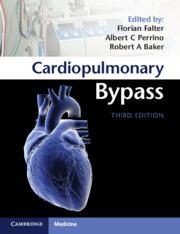Book contents
- Cardiopulmonary Bypass
- Cardiopulmonary Bypass
- Copyright page
- Contents
- Contributors
- Foreword
- Chapter 1 Human Factors and Teamwork in Cardiac Surgery
- Chapter 2 Equipment for Cardiopulmonary Bypass
- Chapter 3 Monitoring during Cardiopulmonary Bypass
- Chapter 4 Cardiopulmonary Bypass Circuit Setup and Safety Checks
- Chapter 5 Priming Solutions for Cardiopulmonary Bypass Circuits
- Chapter 6 Anticoagulation for Cardiopulmonary Bypass
- Chapter 7 Conduct of Cardiopulmonary Bypass
- Chapter 8 Minimal Invasive Extracorporeal Circulation
- Chapter 9 Considerations for Operations Involving Deep Hypothermic Circulatory Arrest
- Chapter 10 Metabolic Management during Cardiopulmonary Bypass
- Chapter 11 Myocardial Preservation during Cardiopulmonary Bypass
- Chapter 12 Weaning from Cardiopulmonary Bypass
- Chapter 13 Intraoperative Mechanical Circulatory Support and Other Uses of Cardiopulmonary Bypass
- Chapter 14 Mechanical Circulatory Support
- Chapter 15 Cardiopulmonary Bypass for Pediatric Cardiac Surgery
- Chapter 16 Coagulopathy and Hematological Disorders Associated with Cardiopulmonary Bypass
- Chapter 17 Inflammation and Organ Damage during Cardiopulmonary Bypass
- Chapter 18 Neuromonitoring and Cerebral Morbidity Associated with Cardiopulmonary Bypass
- Chapter 19 Renal Morbidity Associated with Cardiopulmonary Bypass
- Chapter 20 Common and Uncommon Disasters during Cardiopulmonary Bypass
- Index
- References
Chapter 19 - Renal Morbidity Associated with Cardiopulmonary Bypass
Published online by Cambridge University Press: 24 October 2022
- Cardiopulmonary Bypass
- Cardiopulmonary Bypass
- Copyright page
- Contents
- Contributors
- Foreword
- Chapter 1 Human Factors and Teamwork in Cardiac Surgery
- Chapter 2 Equipment for Cardiopulmonary Bypass
- Chapter 3 Monitoring during Cardiopulmonary Bypass
- Chapter 4 Cardiopulmonary Bypass Circuit Setup and Safety Checks
- Chapter 5 Priming Solutions for Cardiopulmonary Bypass Circuits
- Chapter 6 Anticoagulation for Cardiopulmonary Bypass
- Chapter 7 Conduct of Cardiopulmonary Bypass
- Chapter 8 Minimal Invasive Extracorporeal Circulation
- Chapter 9 Considerations for Operations Involving Deep Hypothermic Circulatory Arrest
- Chapter 10 Metabolic Management during Cardiopulmonary Bypass
- Chapter 11 Myocardial Preservation during Cardiopulmonary Bypass
- Chapter 12 Weaning from Cardiopulmonary Bypass
- Chapter 13 Intraoperative Mechanical Circulatory Support and Other Uses of Cardiopulmonary Bypass
- Chapter 14 Mechanical Circulatory Support
- Chapter 15 Cardiopulmonary Bypass for Pediatric Cardiac Surgery
- Chapter 16 Coagulopathy and Hematological Disorders Associated with Cardiopulmonary Bypass
- Chapter 17 Inflammation and Organ Damage during Cardiopulmonary Bypass
- Chapter 18 Neuromonitoring and Cerebral Morbidity Associated with Cardiopulmonary Bypass
- Chapter 19 Renal Morbidity Associated with Cardiopulmonary Bypass
- Chapter 20 Common and Uncommon Disasters during Cardiopulmonary Bypass
- Index
- References
Summary
Acute kidney injury is the most common major complication after cardiac surgery. The incidence of cardiac surgery-associated AKI (CSA-AKI) varies between 5% to 40% and leads to dramatically worse outcomes. The incidence of CSA-AKI requiring renal replacement therapyafter coronary artery bypass grafting alone is roughly 1%. After valve surgery or combined CABG plus valve surgery the risk of requiring RRT increases to 1.7 and 3.3% respectively.Regardless of its reversibility, CSA-AKI has been associated with increased mortality and risk of developing chronic or end-stage renal disease, and consequently generating substantial cost.
Keywords
- Type
- Chapter
- Information
- Cardiopulmonary Bypass , pp. 184 - 193Publisher: Cambridge University PressPrint publication year: 2022



